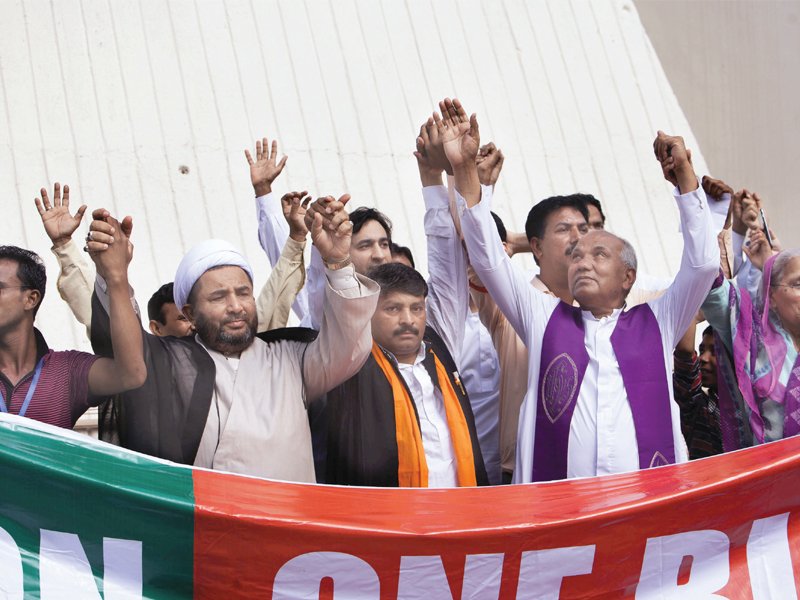
In recent weeks, an alliance with the hashtag ‘Pakistan for All’ has triggered discourse on religious and sectarian intolerance, to gather a chagrined realm of people under a single banner calling for an end to violence.
In a heartening display of unity, over a hundred people gathered inside the unassuming gates of Our Lady of Fatima Church in Sector F-8/4 in a show of resistance against forces threatening peace within the country. The human chain that began outside a Karachi church has since travelled to Lahore and now dawned in the capital as a show of unyielding force.

Citizens’ groups gathered, including Islamic scholars outside the Our Lady of Fatima Church in Islamabad to speak out against acts of terrorism against minority groups. Around a 100 people stood guard by the periphery of the church, holding hands in a human chain to endorse peace and tolerance. PHOTO: MYRA IQBAL/ EXPRESS
“Those who instigate fear and violence have misunderstood Islam,” asserted Maulana Hassan, a religious scholar, adding that while Islam called for the protection of all minorities, a misinterpretation of its script has equipped some followers with lessons of intolerance. “There is a need for a closer, more holistic study of the Quran,” he added.
Maulana Agha Asif Wahidi, another religious leader who was present to show solidarity with the country’s battered minorities, lamented that terrorists attacked in broad daylight and escape without notice. He said there was a sense of frustration among people toward the government’s inability to weed out terrorism and to strengthen peacekeeping and enhance security.
Vice-Chancellor of the Hindu Rights Movement, Ashok Chand, and Father Rahmat Michael Hakim, were also present at the gathering and endorsed the need for peace and tolerance.
“We have been here since before partition. We have an equal claim as citizens,” expressed Chand, whose sentiments reflect those of minority groups across Pakistan grappling with a dual identity that is challenged when tragedy strikes.
A link amidst the sprawling human chain, Rubina Teressa is gripped with fear in the aftermath of the bombing at a Peshawar church that claimed over a 100 lives.
“We come here once a week for spiritual fulfillment,” Rubina explains, holding back tears of resentment and desolation, “Nobody should have to go to their place of worship thinking it will be their last time.”

A few linkages apart, Mrs. Junaid’s voice rises as she engages in a conversation with fellow protestors. Sharing her concerns Mrs Junaid suggests: “In the end it is the citizen, the ordinary man that suffers from load shedding to bomb blasts. We are the ones who bear the brunt of injustice.”
With a curious 10-year-old son to answer to, Mrs Junaid relays her embarrassment in tutoring him about textbook governance, “I feel like a hypocrite telling him that governance means looking after the health, education, energy and security needs of a country.”
Intrinsic to such movements is the cynicism whether a few hundred people can pave a surer future and while the act of linking hands to protect a church in a quiet, upscale neighborhood is merely symbolic, the growth of the movement into a lobby group is one that activist Taimur Rehman believes will serve to break down walls.
“The human chain embodies the sentiments of millions of others across the country that couldn’t be here,” he shared, taking a break from chanting fiery slogans, brandishing the strength of civilians to rouse positivity and peace.
Sara Seerat, a young lawyer present at the gathering reinforced Rehman’s view, in branding the movement as a tool for opening up a wider debate about intolerance, terrorism and the silence of the majority.
“If we keep worrying about consequences, we will lose our voices,” shared Basharat Masih, project officer at the National Commission for Peace and Justice. Extending Masih’s foreboding call for action, Jibran Nasir, who initiated the movement added: “I fear that if we don’t do anything, we will be killed in our sleep someday.”
Published in The Express Tribune, October 14th, 2013.



1732256278-0/ellen-(1)1732256278-0-165x106.webp)
1725877703-0/Tribune-Pic-(5)1725877703-0-165x106.webp)
1732257537-0/Copy-of-Untitled-(64)1732257537-0-270x192.webp)
1726722687-0/Express-Tribune-Web-(9)1726722687-0-270x192.webp)










COMMENTS
Comments are moderated and generally will be posted if they are on-topic and not abusive.
For more information, please see our Comments FAQ